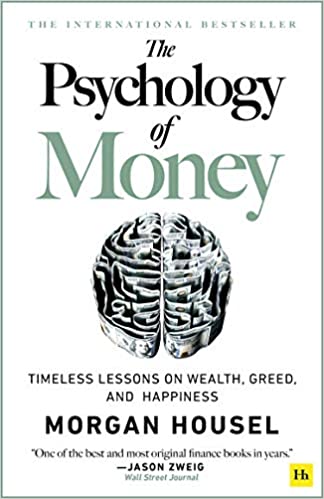This post is part of the 📖 The Psychology of Money series.
Today, I am reading Freedom chapter from the book The Psychology of Money: Timeless lessons on wealth, greed, and happiness written by Author, Morgan Housel.
Doing well with money isn’t necessarily about what you know. It’s about how you behave. And behavior is hard to teach, even to really smart people.
In The Psychology of Money, award-winning author Morgan Housel shares 19 short stories exploring the strange ways people think about money and teaches you how to make better sense of one of life’s most important topics.
Yesterday, I finished reading the sixth short story Tails, You Win from the book The Psychology of Money.
Freedom
Controlling your time is the highest dividend money pays.
The highest form of wealth is the ability to wake up every morning and say, “I can do whatever I want today.”
People want to become wealthier to make themselves happier. Happiness is a complicated subject because everyone’s different. But if there’s a common denominator in happiness — a universal fuel of joy — it’s that people want to control their lives.
The ability to do what you want, when you want, with who you want, for as long as you want, is priceless. It is the highest dividend money pays.
What matters most is quality friendships, being part of something bigger than themselves, and spending quality, unstructured time with your children.
That’s it for today. Tomorrow, we will read the next chapter Man in the Car Paradox, no one is impressed with your possessions as much as you are.
No One’s Crazy
Every decision people make with money is justified by taking the information they have at the moment and plugging it into their unique mental model of how the world works.
Luck & Risk
Nothing is as good or as bad as it seems. More important is that as much as we recognize the role of luck in success, the role of risk means we should forgive ourselves and leave room for understanding when judging failures.
Never Enough
There are many things never worth risking, no matter the potential gain. Knowing when you have “enough” is an invaluable skill. Building a sense for “enough” is remarkably simple: Stop taking risks that might harm your reputation, family, freedom and independence.
Don’t forget that being loved by those “whom you want to love” is invaluable than risking everything for money.
Confounding Compounding
Good investing isn’t necessarily about earning the highest returns. It’s about earning pretty good returns that you can stick with and which can be repeated for the longest period of time.
Getting Wealthy vs Staying Wealthy
Good investing is not necessarily about making good decisions. It’s about consistently not screwing up. There are a million ways to get wealthy and plenty of books on how to do so. But there’s only one way to stay wealthy: some combination of frugality and paranoia.
Getting money is one thing. Keeping it is another. If you have to summarize money success in a single word, it would be “survival”.
Tails, You Win
Gains come from a small per cent of your actions called “Long Tail Events”. You can be wrong half the time and still make a fortune. Remember, tails drive everything. Just do the average thing when all those around you are going crazy.
Freedom
Controlling your time is the highest dividend money pays. The ability to do what you want, when you want, with who you want, for as long as you want, is priceless. It is the highest dividend money pays.
Buy or not to buy
If you want to be wealthy and then stay at the totem pole forever, you must immediately read this book. I bought several copies of this book to gift friends and family. It’s an easy read with a lot of anecdotes and real-life lessons. I already implemented several hacks in my life whistle taking investment decisions.
Author(s): Morgan Housel
Part 9 of 23 in the 📖 The Psychology of Money book series.
Series Start | The Psychology of Money: Timeless lessons on wealth, greed, and happiness - Day 8 | The Psychology of Money: Timeless lessons on wealth, greed, and happiness - Day 10
